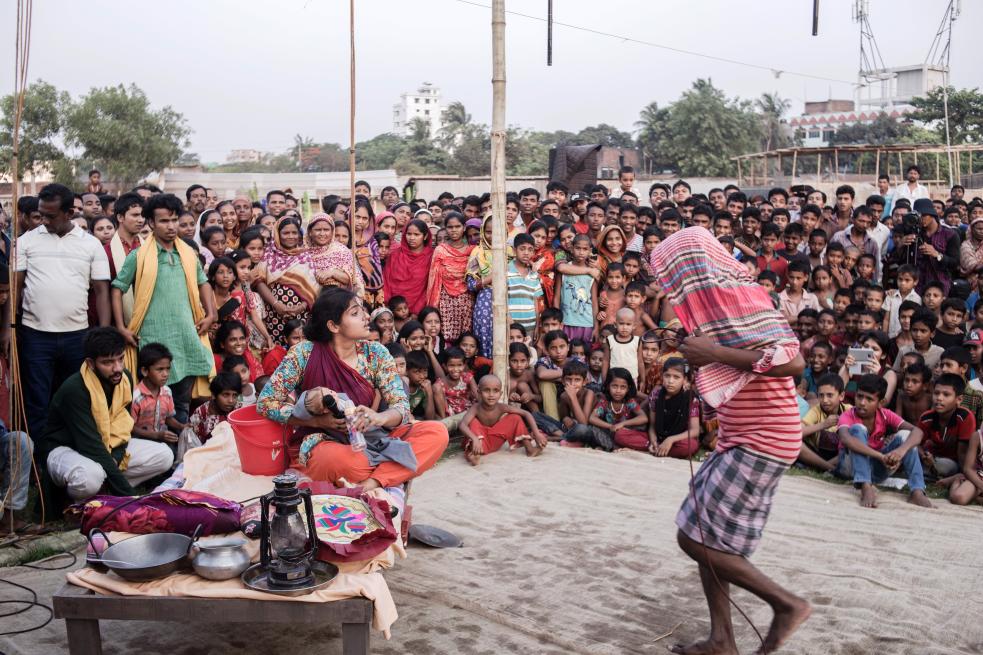The Lived Experience of Climate Change
Based on a research project exploring the experiences of slum dwellers in Bangladesh, this project sought to share the research with those affected through performance.

This project looks at the everyday challenges the effects of climate change place on individuals.
We are, perhaps, all-too-familiar with the economic and political challenges that climate change poses. But by following people living in the slums of Dhaka in Bangladesh for several months, Dr Joanne Jordan dug deeper into how they responded to its effects, and what this might tell us about wider issues such as equality, culture and gender.
Dhaka in Bangladesh is on the front line of climate change. Dr Jordan, from Manchester University’s Global Develoment Institute, spent several months talking to over 600 people in their homes, workplaces, teashops and on street corners to understand how climate change is linked to many other problems experienced in their ‘everyday’ life.
Her findings are explored in collaboration with the University of Dhaka through a ‘Pot Gan’; a traditional folk performance, featuring melody, drama, pictures and dancing, which encouraged slum dwellers, researchers, practitioners and policymakers to reflect on the day to day realities of living with climate change.
This mini-documentary is a helpful guide to the whole project.
Project partners
Dr Joanne Jordan – Lecturer in Climate Change and Development, the Global development Institute, Univerity of Manchester
Mr Ahsan Khan - Lecturer in Performance Theatre, Department of Theatre and Performance Studies, University of Dhaka
MA students in Theatre, Department of Theatre and Performance Studies, University of Dhaka (around 19 of them)
Green Ink Productions, makers of the mini-documentary
Aims
This project aimed to examine the everyday realities and impact of climate change on the lives of slum dwellers, specifically in Dhaka, Bangladesh, and to communicate the findings to a diverse audience in an innovative manner that's accessible, engaging, and challenges pre-existing notions.
Background
Climate change is one of the biggest environmental and development challenges of the 21st century, and Bangladesh is one of the most vulnerable countries to global climate change.
The research centres on the day-to-day impact of climate change on the lives of slum dwellers in Dhaka, Bangladesh.
Around 60% of Bangladesh’s urban population live in slum areas. Those living in slums bear the brunt of the effects of flooding because of the pooly-located housing, a lack of government investment and rhe fact that they tend to live in low lying areas prone to floods.
Approach
Climate experts suggest that a resilient community can better withstand disturbances, self-organise and learn and adapt to change when required.
While the poor show significant capacity to develop strategies to improve their resilience to climate stress, it has also been suggested that such strategies can be influenced by lack of formal land tenure rights as insecure land tenure can affect incentives for people to invest scarce resources in risk reduction.
This study uses a mixed method approach to examine how land tenure influences climate change impacts and how land tenure can influence strategies for enhancing resilience to climate change.
The findings were presented in the form of an indigenous drama know as a ‘Pot Gan’. It was developed as part of a Master’s course unit on ‘Theatre for Development’ at the University of Dhaka, helping Bangladeshi students learn about crucial global issues that have a local impact.
Three live Pot Gan performances in Dhaka were attended by over 600 people in Dhaka in April 2016, including: slum dwellers; policy makers; practitioners; academics; and the general public.
Evaluation
An online questionnaire has been central to gathering feedback from the viewers of the Pot Gan. This has so far been conducted for those who viewed the live performance of the Pot Gan and is being expanded to those who view the online documentary.
In a survey of the varied audiences who saw the live Pot Gan performance, 100% who responded agreed that performances like the Pot Gan are a useful way to build awareness on climate change. More than 80% said they had learned something new about climate change as a result of viewing the Pot Gan.
Lessons learned
The project has highlighted the importance of working across different disciplines in order to engage with the public.
It has taught the project team that it is not only important to build awareness on climate change and poverty through research, but to move beyond that and encourage people to discuss the research findings in new and innovative ways.
It also highlights the importance of using theatre performance as a tool to gather post-research feedback from research participants.
Legacy
The Pot Gan performance in its live form and within the documentary will be the most tangible legacy of the project. More than 100,000 people have viewed the project documentary online since it was released in September 2016.
Other highlights include:
- Winner of The University of Manchester Making a Difference Awards 2017 for outstanding public engagement initiative (Out of over 130 applications)
- Accompanied by high-profile events, such as a public event on ‘The Lived Experience of Climate Change’ at Rich Mix London, attended by 200 people (2 February 2017) and the premiere of the project documentary as part of Manchester Museum’s Climate Control exhibition (24 August 2016), attended by a capacity audience of 100 people.
- The project materials have been used as teaching resources at the University of Manchester
- Established new partnerships with organisations based in Bangladesh and the UK, including: University of Dhaka; Brick Lane Circle; Theatre of Debate; Tie-Dye Drama; Manchester Museum; Green Ink; Regent’s High School; Rich Mix; and the British Council Bangladesh.
Contact
For further information, please see the University of Manchester webpages.
Email: joanne.jordan@manchester.ac.uk
Twitter: @JoanneCJordan #GDIpotgan
Facebook: www.facebook.com/GDIpotgan
